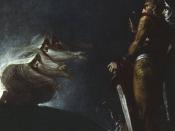In the Shakespearean play Macbeth, Macbeth, the play's protagonist, undergoes a significant transition in his evolution from a brave and loyal war hero to a tyrant who brings chaos and destructions to Scotland. At the beginning of the play, Macbeth is described as being "too full of the human kindness/To catch the nearest way" (Shakespeare 39, Act 1, scene 5, l 16 - 17) but towards the end of the play, Malcolm describes him as "butcher" (Shakespeare 257, Act 5, scene 9, l 41), who only seeks revenge and bloodshed. Our initial impression of Macbeth, based on the wounded soldier's report, is a courageous and capable warrior. Nonetheless, we later realize that Macbeth's bravery is accompanied by ambition and self-doubt. He spirals out of control, eventually killing his king, his friend, and a vast number of innocent people. Towards the end of the play, we see the terrible effects that ambition and guilt can have on a man who lacks strength of character.
As Macbeth's unchecked ambition joins his brave and self-doubting nature, we realize that his ambition is only leading him to his demise.
In several parts of the play, Macbeth shows extreme bravery and honour. We clearly see his physical power in the beginning of the play through his victories over Scotland's enemies. This is evident when the wounded solider describes Macbeth's triumph over Macdonwald to the king by saying, "But all's too weak, /For brave Macbeth - well he deserves that name-/Disdaining Fortune, with his brandished steel/...Like Valour's minion carved out his passage" (Shakespeare 13, Act 1, scene 2, l 17 - 21). As the solider is carried off to have his wounds attended to, Ross, a Scottish nobleman, enters and further establishes our impression of Macbeth's bravery by telling the king that the traitorous thane of...


